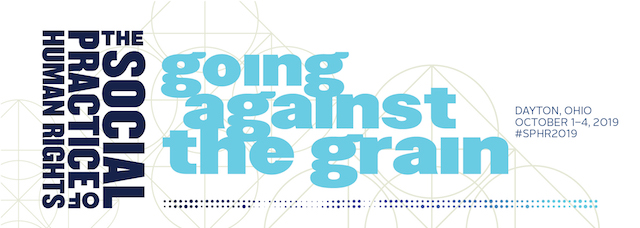Paper/Proposal Title
Grassroots Globalism: Human Rights Cities and Local Human Rights Implementation
Location
Local Human Rights Movements
Start Date
10-4-2019 8:30 AM
End Date
10-4-2019 10:00 AM
Keywords
Human Rights Cities, Human Rights Monitoring, Universal Periodic Review
Abstract
This presentation reports on how local human rights activists are mobilizing around the United States's 2019-2020 Universal Periodic Review process in the UN Human Rights Council. Organizers with the US Human Rights Cities Alliance have been promoting "UPR Cities" to engage local activists in work to document local human rights conditions and develop recommendations for a national civil society stakeholder report that will be submitted to the UN Human Rights Council. The UPR Cities serves three key purposes: First, it helps inform and inspire local and trans-local mobilization and alliance building around a human rights framework, advancing analyses of the common local challenges and remedies and best practices for promoting and protecting human rights in communities. Second, it builds local constituencies that “translate” human rights into local contexts and hold local officials accountable to international human rights laws and standards. Third, it strengthens the voice of U.S. civil society in the United National Human Rights machinery, contributing to the strengthening of global human rights institutions and law. Presentations will feature accounts from particular cities engaged in the UPR Cities project and from national human rights cities leaders working to compile the national civil society “shadow report” to the United Nations/ UPR process. Presenters will reflect on how the initiative relates to ongoing work to promote human rights cities organizing while building a national support structure to advance local human rights mobilization in the United States and connect it with the global human rights movement. What themes and recommendations are emerging when we consider the application of human rights principles in cities and other local communities facing the contemporary challenges created by economic globalization, rising inequality, corporate power, and climate change? Can the Human Rights Cities movement help revitalize the global human rights movement and strengthen international human rights law? Does this model serve as a promising antidote to the polarized politics and growing economic exclusion that characterize this political moment?
Author/Speaker Biographical Statement(s)
Jackie Smith is professor of sociology at the University of Pittsburgh and editor of the Journal of World-Systems Research. She is an activist/organizer who co-founded and co-coordinates the Pittsburgh Human Rights City Alliance. Smith serves on the national steering committee of the National Human Rights Cities Alliance, and is co-founder of the International Network of Scholar-Activists. She also works closely with May First/People Link, a technology and communications justice organization. An article on the Human Rights City project in Pittsburgh appeared in a recent issue of Studies in Social Justice (available online).
Included in
Legal Studies Commons, Politics and Social Change Commons, Public Affairs, Public Policy and Public Administration Commons, Urban Studies and Planning Commons
Grassroots Globalism: Human Rights Cities and Local Human Rights Implementation
Local Human Rights Movements
This presentation reports on how local human rights activists are mobilizing around the United States's 2019-2020 Universal Periodic Review process in the UN Human Rights Council. Organizers with the US Human Rights Cities Alliance have been promoting "UPR Cities" to engage local activists in work to document local human rights conditions and develop recommendations for a national civil society stakeholder report that will be submitted to the UN Human Rights Council. The UPR Cities serves three key purposes: First, it helps inform and inspire local and trans-local mobilization and alliance building around a human rights framework, advancing analyses of the common local challenges and remedies and best practices for promoting and protecting human rights in communities. Second, it builds local constituencies that “translate” human rights into local contexts and hold local officials accountable to international human rights laws and standards. Third, it strengthens the voice of U.S. civil society in the United National Human Rights machinery, contributing to the strengthening of global human rights institutions and law. Presentations will feature accounts from particular cities engaged in the UPR Cities project and from national human rights cities leaders working to compile the national civil society “shadow report” to the United Nations/ UPR process. Presenters will reflect on how the initiative relates to ongoing work to promote human rights cities organizing while building a national support structure to advance local human rights mobilization in the United States and connect it with the global human rights movement. What themes and recommendations are emerging when we consider the application of human rights principles in cities and other local communities facing the contemporary challenges created by economic globalization, rising inequality, corporate power, and climate change? Can the Human Rights Cities movement help revitalize the global human rights movement and strengthen international human rights law? Does this model serve as a promising antidote to the polarized politics and growing economic exclusion that characterize this political moment?



